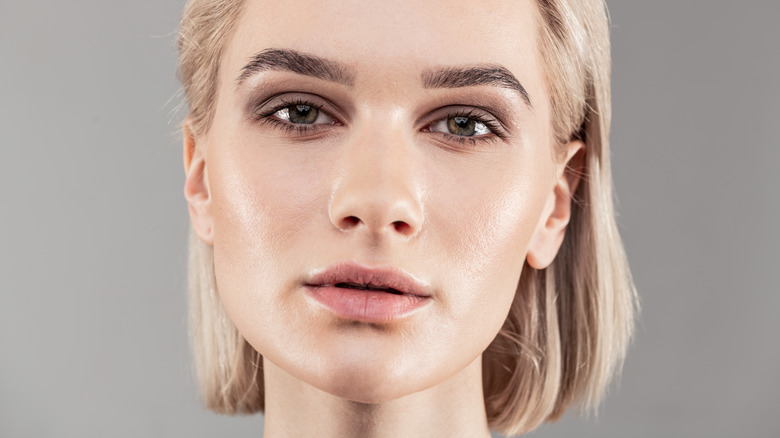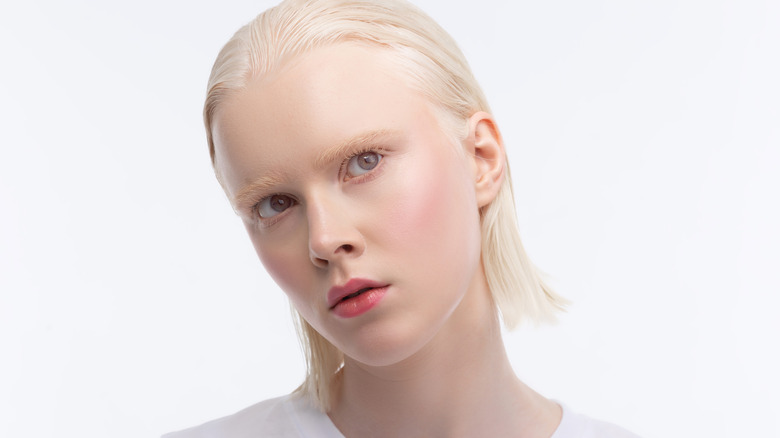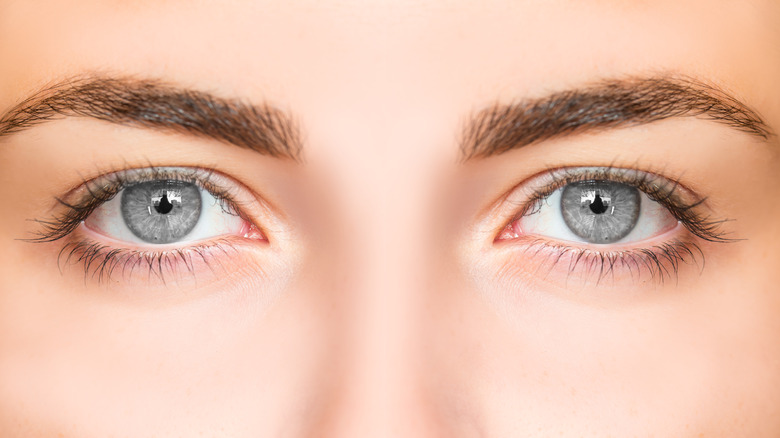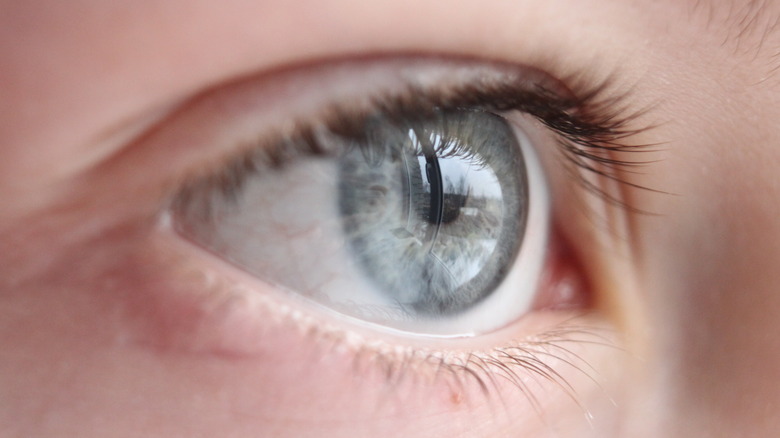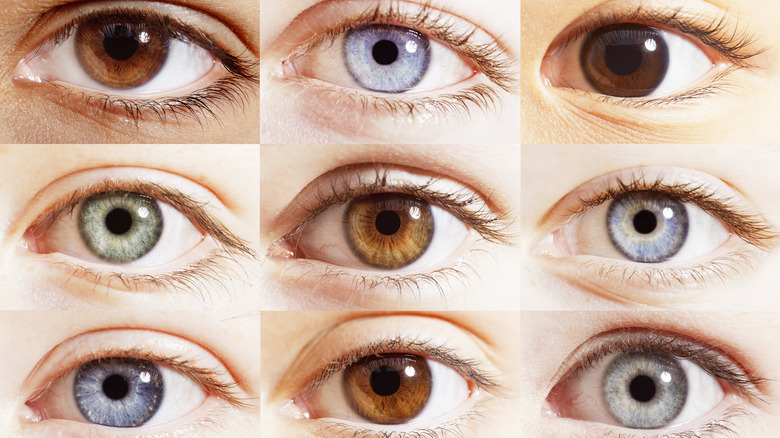What You Should Know About One Of The World's Rarest Eye Colors
Gray eyes are anything but what many may associate with the color gray — like gloomy skies and drab and depressing color schemes. If you ever look deeply into a pair of gray eyes, what you may have thought about the color may just be quickly proven wrong. Once you look closely at gray eyes, you'll see that gray is a color that has depth and warmth. Far from being dull and dreary, gray eyes are mesmerizing and captivating. There's something rather alluring and perhaps just a little bit mysterious about gray eyes. Even people blessed with this rare eye color, though, may not know the fascinating story behind their eyes.
Get ready to learn everything you've ever wondered about gray eyes, from the complicated science behind them to the myths that surround them. The truth about gray eyes is as riveting as gray eyes themselves. Whether you have gray eyes yourself or have a loved one with eyes of this unusual hue, after learning these tidbits about gray eyes you'll never look at the color the same way again.
Gray eyes are super rare
You probably don't know many people who have gray eyes, let alone have gray eyes yourself. This is because gray eyes are one of the rarest eye colors in the world. When we say rare, we mean rare. According to World Atlas, less than one percent of the global population has gray eyes, making the color incredibly hard to find.
Gray eyes are also pretty isolated. Unless you're of European ancestry, you don't have much of a chance of inheriting this rare hue. Most of the world has shades of brown eyes, while gray, blue, hazel, and green eyes are typically only found in people who are of European ancestry. Even among those of European descent, gray eyes are still far from common and can be found in people who are of northern or eastern European ancestry.
The rarity of gray eyes is quite likely a large part of the reason that they are still surrounded by so much mystery.
Gray eyes are often mistaken for blue eyes
If you think someone has blue eyes, you might want to look a little closer. While it's possible that their hue is truly blue, there's also a chance that their eyes are gray. Gray eyes are often mistaken for blue and, as Verywell Health notes, gray wasn't even considered an eye color in its own right until fairly recently. Instead, people with gray eyes were marked down as having blue eyes, with little research being done on gray eyes.
It's no wonder, then, there's so much mystery and misunderstanding around gray eyes. There is a trick, though, to telling gray eyes and blue eyes apart. According to the Eye Doctors of Washington, eyes that are truly blue will have a pure blue color. Gray eyes, on the other hand, show traces of other colors.
"Grey eyes are like the hazel in the blue eye family," Sephora Pro makeup artist Amy Suchma explained to HuffPost. "They are usually a combination of grey, blue, green and a small amount of yellow around the pupil."
Scientists aren't actually sure what causes gray eyes
According to The Tech, scientists aren't sure what causes gray eyes, but there are a couple of theories.
First, we have to look at the anatomy of the iris, the part of the eye that has color. There are two layers of the iris, and between these two layers is the stroma. In dark eyes, melanin (the pigment that gives eyes their color) is plentiful in the front and back layers of the iris. This melanin then absorbs any light that hits it. In lighter eyes, there is less melanin, so the light goes through the front layer of the iris, reflecting off the melanin in the back of the eye. When it hits the stroma, which is filled with collagen, the light bends and gives off a blueish hue.
Scientists think that dark gray eyes might be the result of a thin layer of melanin in the front layer of the iris, causing a sort of cloud in front of the bent light which then dims the blue color. They also think that light gray eyes might be caused by eyes having very little melanin in the front layer of the iris.
People with gray eyes should always wear sunglasses outdoors for this reason
While having gray eyes might seem lucky because they're so rare, having gray eyes isn't necessarily a good thing. There are some risks associated with having eyes of this hue. If you have gray eyes, you should take special care to protect your eyes from the glare of the sun. "People with light iris color need to be diligent in wearing UV-protected sunglasses," ophthalmologist Ruth Williams told Everyday Health.
The increased risk of cancer is because of the lack of pigment in the eye. Less pigment means less protection from the sun, which means people with gray eyes are at a greater risk for melanoma of the uvea (the eye's middle layer). Having a greater risk of cancer might sound scary, but fortunately this type of cancer is pretty rare. It affects roughly six in every million adults in the U.S. annually, so, if you have gray eyes, there's no need to worry too much as long as you're taking precautions. And hey, at least it's a good excuse to buy a new pair of shades!
People with vitiligo are less likely to have gray eyes
While studies show that people with gray eyes may be more likely to develop uveal cancer, it's not all bad news. People with gray eyes are also less likely to have vitiligo. A study published in Nature Genetics and summarized by the University of Colorado Anschutz Medical Campus website said that, in a study of 3,000 people, just 27 percent of vitiligo patients had blue or gray eyes, 30 percent had green or hazel eyes, and 43 percent had tan or brown eyes.
The autoimmune disease causes a person's immune system to attack their pigment cells. The lowered risk for vitiligo suggests that people with gray eyes may have a lower risk for a few other autoimmune diseases as people with vitiligo are at higher risk for a slew of other autoimmune diseases, including thyroid disease, type 1 diabetes, and lupus. While having gray eyes doesn't mean you're immune, it may mean your chances of getting one of these diseases are lower.
Gray eyes are more sensitive to light
If you are one of the rare people on the planet who has gray eyes, you might find that you're more sensitive to light than your friends and family who have darker colored eyes. It's not your imagination — there's a scientific explanation for why people with lighter eyes are more sensitive to bright light. According to Duke Health, melanin in eyes does more than just make eyes look darker. That pigmentation also helps protect eyes from the light. That's why people with light eyes are more likely to be bothered by harsh lighting, and might be inclined to shy away from going outside on a particularly sunny day.
This sensitivity to light is called photophobia and it's not a very pleasant condition. People with photophobia may have a mild reaction to light and simply squint when things are too bright for them, but they may also experience pain around the eyes when exposed to bright light. People with photophobia may also have trouble actually seeing or focusing. Fortunately, the effects of photophobia are temporary. While the condition may be uncomfortable, it doesn't result in any permanent loss of vision.
People with gray eyes might drink more
If you know a person with gray eyes who also happens to drink a bit more than average, it might have something to do with their genes. According to a study published in Personality and Individual Differences (via Psychology Today), people with light-colored eyes might be predisposed to drink more. The study showed that people with light eyes may be less sensitive to alcohol than people with dark eyes and that they are able to consume more before becoming intoxicated.
This lack of sensitivity carries over to other areas. Light-eyed people are not just less sensitive to alcohol, but are also less sensitive to medicine, according to a study published in the ominously named Journal of Pain (via Psychology Today). One of the areas where this lessened sensitivity is useful is when it comes to pain. It seems that people who have light eyes are less sensitive to pain and are better able to tolerate it than their dark-eyed counterparts. This holds true even when the pain is overwhelming. The study showed that women who have light eyes experienced less pain than women with dark eyes when they were giving birth.
There are some strange superstitions about gray eyes
Over the years, people have come up with a lot of strange beliefs about what gray eyes mean. While in modern times we know that gray eyes are just, well, eyes, superstitions can still be fun as long as we don't take them seriously. According to the Encyclopedia of Superstitions, Folklore, and the Occult Sciences of the World, men with gray eyes are the most faithful, but gray eyes also indicate a person "of weak intellect, devoid of wit" and "a plain, plodding, downright drudge." Yikes.
Men with gray eyes might be more faithful than men with eyes of other colors, but the eye color apparently isn't an indicator of a pleasant personality in women. According to Superstitions: 10,000 You Really Need, it's women with blue eyes who are faithful. Gray-eyed woman are instead supposedly greedy.
An old children's rhyme from What They Say in New England: A Book of Signs, Sayings, and Superstitions, originally published in 1896, breaks down what each eye color means. Again, people with gray eyes get the short end of the stick: "Gray eyes, greedy; Blue eyes, beauty; Black eyes, pig-a-pies, Sure to tell lies."
The ancient Greeks associated gray eyes with wisdom
One of the most powerful of the ancient Greek gods was Athena. Athena was the daughter of Zeus, the king of the gods, and the Titan Metis. She was revered as the goddess of war (and conversely, peace) and was also the goddess of arts and crafts. The goddess is probably best remembered, though, as the goddess of wisdom. And, oh yeah, she just so happened to have gray eyes.
The ancient Greeks viewed gray eyes as a symbol of wisdom, although it's not clear whether it's because the goddess of wisdom had gray eyes or if Athena was described as having gray eyes because the association between gray eyes and wisdom already existed. The gray-eyed deity was also affiliated with owls, another symbol of wisdom that we still associate with wisdom in modern times. Who knew that the mystical power of gray eyes had such a long and magical history?
People with gray eyes are more strategic thinkers
While the ancient Greeks may have associated gray eyes with wisdom, they probably didn't have much to back it up besides mythology and superstition. Modern scientists, however, have proven that they may have been on to something. It turns out that, while people with gray eyes may not necessarily be wiser, they do seem to have a gift for strategic thinking.
According to Essilor, a study conducted in the 1990s found that, while people with light eyes tend to think more slowly than people with dark eyes, they also think more strategically. The slower reaction times of people with light eyes is attributed to melanin. People with gray and other light-colored eyes have not just less melanin in their eyes, but also less melanin in their brains, which leads to slower reaction times as a brain works more quickly when it has more melanin.
It was once a common belief that people with gray eyes are better marksmen
Not all of the beliefs surrounding people with gray eyes are superstitious. In 1918, the Sausalito News came out stating that gray-eyed people are better marksmen. The theory wasn't just a shot in the dark, either, but was formed after observing soldiers at Camp Bowie, a military training camp.
Applied Colloid Chemistry: General Theory, a science text originally published in 1926, also posits the theory that blue-eyed and gray-eyed people are better shots with a rifle. It cited a study that seemed to corroborate the theory, but also added that two thirds of 100,000 white soldiers have blue or gray eyes, which might account for the fact that so many soldiers with blue and gray eyes were found to be better marksmen.
The theory can also be found in the literature of the time. Ambrose Bierce's short story, An Occurrence at Owl Creek Bridge, published in 1890, alludes to the belief. "He observed that it was a grey eye and remembered having read that grey eyes were keenest, and that all famous marksmen had them," wrote Bierce as he described a man with a gun.
This is what dreaming of gray eyes means
If you have ever dreamed of a person with gray eyes, it might have a special meaning. According to The Dictionary of Dreams: Every Meaning Interpreted, each eye color has a different meaning in dream interpretation. Now, of course, dream interpretation is not an acknowledged field of science, so we should take these interpretations with a grain of salt.
Brown eyes are the scariest to dream about as they supposedly represent "deceit and perfidy." Blue eyes reportedly indicate that the dreamer is weak when it comes to seeing things through. Gray eyes allegedly "[denote] a love of flattery for the owner."
Like we said, though, it's not an exact science. Dream interpretation can get pretty confusing — especially if you're one of the people who only dreams in black and white. In all likelihood, dreaming of someone with gray eyes is nothing more than just a dream.
Newborns often have gray eyes that later change color
Many babies are born with either gray or blue eyes. While they might have one of these rarer eye colors when they're born, it doesn't necessarily mean that their eyes will still be light once they're all grown up. It's not uncommon for a baby's eye color to change as they get older. This is because eye color depends on melanin, which is secreted by cells called melanocytes. As a baby ages, the melanocytes begin responding to light and secrete more melanin which often makes a baby's eyes grow darker.
While it's still possible a baby born with light blue or gray eyes will keep them, color can deepen until a child is around 3 years old. After that, their eye color is pretty much set, although disease and trauma can change a person's eye color later in life, as can aging.
People with gray eyes are more competitive
If you've got some gray-eyed friends, you definitely want them on your team at your next game night. It turns out that people with gray eyes have a distinct advantage when it comes to competitions. Studies show that people with gray eyes are more competitive, making them prime teammates (if you care about winning, that is). The study, published by Current Psychology and summarized by Joe, found that people with lighter-colored eyes have a tendency to not just be more competitive, but to also be more skeptical and egocentric.
Why? Like a lot of traits, it comes down to evolution. "The rare-color advantage of light-eyed females, is likely to increase the chance of being noticed by a male," said the researchers. "Moreover, competitive personality traits (such as wanting to beat others and being skeptical of others' intentions) secure the long-term commitment necessary for self and offspring survival."
Can gray eyes actually change color?
While it would be nice if we could change our eye color as easily as we can change our hair color — well, with the help of hair dye, at least — most of us can't change the shade of our eyes without the help of color contacts. While gray-eyed people can't change their eye color at will, the shade of their eyes can appear to shift depending on a range of factors, including their clothing or the light they're standing in, according to the Eye Doctors of Washington. Gray eyes can even appear to change color with a person's mood, thanks to pupil dilation.
It's a pretty cool trait of gray eyes, although the eyes never actually change color. People who don't naturally have gray eyes, however, may find their eyes turning gray as they get older. According to Dr. David R. Demartini, an ophthalmologist, eyes may turn milky with age, making them look gray (via ShareCare). If you do notice your eyes — gray or not — changing color, schedule an appointment with an eye doctor to rule out any health problems.
Science says gray eyes are neither recessive nor dominant
Given just how rare gray eyes are, you might have assumed that gray eyes are recessive. As it turns out, they're not; however, they aren't dominant either, according to All About Vision.
You might have learned in your high school biology class that two parents with brown eyes will only have brown-eyed children, but the genetics behind eye color inheritance are a bit more complicated than that. Many more factors go into determining what color eyes a baby will have than scientists previously thought. While it's true that brown-eyed parents are more likely to have a brown-eyed baby, they could also have a baby with blue, green, or even gray eyes.
Instead of thinking of gray eyes in terms of recessive or dominant traits, it is probably more helpful to simply view the eye color as a rare and beautiful occurrence.
Certain colors make gray eyes pop
If you want to make your gray eyes pop, color theory is about to become your new best friend. Since gray eyes contain different hues, you have a wide range of options to choose from. Makeup expert Amy Suchma offered up some cosmetic suggestions to HuffPost, telling the outlet that orange tones around the eyes can make them appear bluer, while reddish and purplish hues will make them look greener. If you want your eyes to look as steely gray as possible, opt for makeup in shades of gray or black.
Wearing black to contrast your gray eyes and really make them stand out (via Our Everyday Life). Depending on where exactly your gray eyes fall on the color spectrum, you could also wear colors suited for blue eyes or green eyes. Just as with picking out makeup shades, complementary colors are the key here, with purple shades being suited for green hues and orange shades bringing out the blue in gray eyes.
